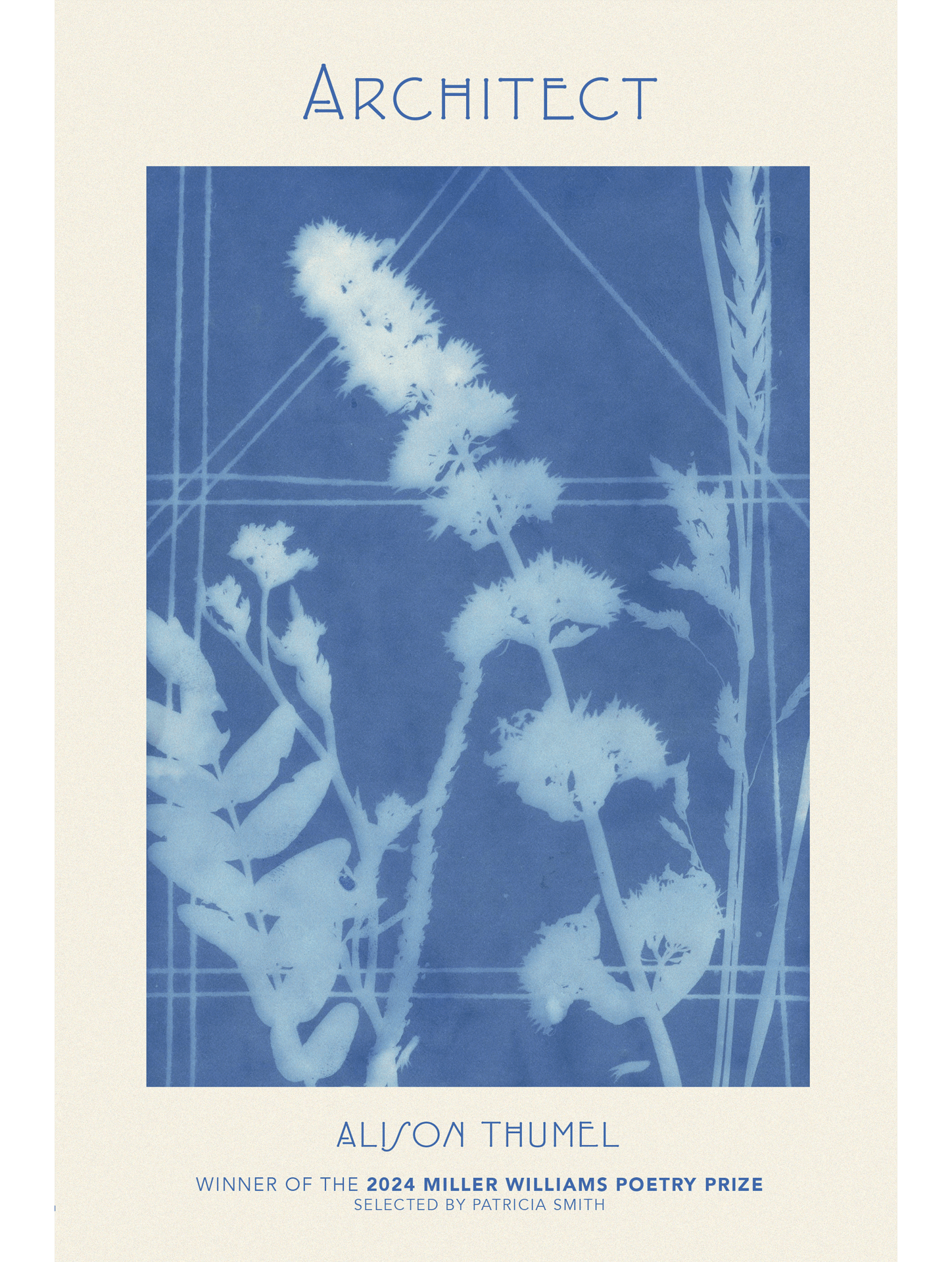Winner, 2024 Miller Williams Poetry Prize
Selected by Patricia Smith
“When he died, my brother became the architect of the rest of my life,” writes Alison Thumel in Architect, which interweaves poems, lyric essays, and visual art to great emotional effect. In this debut collection, the buildings of Frank Lloyd Wright become a blueprint for elegy, as Thumel overlays the language of architecture with the language of grief to raze and reconstruct memories, metaphors, and myths. With obsessive and exacting focus, the poet leads us through room after room in a search to answer whether it is possible to rebuild in the wake of loss. Meanwhile, the midwestern landscape beyond these rooms—the same landscape that infuses the low, horizontal forms of Wright’s Prairie Style buildings—shapes the figures in Architect as well as their fates: “For years after my brother’s death, I collected news articles on people who died young and tragically in landlocked states. Prairie Style deaths—boys sucked down into grain silos or swept up by tornadoes or fallen through a frozen pond. The boys I didn’t know, but the landscape I did. The dread of it. How many miles you can look ahead. For how long you see what is coming.”

Alison Thumel’s poems have appeared in Poetry, the Adroit Journal, and elsewhere. She is the recipient of a Wallace Stegner Fellowship in poetry at Stanford University, a grant from the Elizabeth George Foundation, and the Martha Meier Renk Fellowship from the University of Wisconsin–Madison, where she completed her MFA.
“Alison Thumel’s debut poetry collection Architect, winner of the Miller Williams Poetry Prize, is a work that builds and rebuilds with clear mathematical precision, a devastating record of how words function in the wake of loss. Architect presents poetry as process, poetry as revision itself, through a mind at work—a mind of generous intellect and innovation, but also a mind working through incomparable grief. … Thumel’s poetry works line by line, room by room, to lay bare the skeleton of grief’s structure—the blueprints, the fixed beams, the absence at the center, not to recover what has been lost, but to reclaim the unbroken truth of love that stands amidst the wreckage.”
—Grace Li, The Adroit Journal, August 2024
“Somewhere between elegy and love letter, Alison Thumel’s Architect creates a living language that could not feel more vital. With Frank Lloyd Wright serving as her Virgil, Thumel builds an animate structure that manages to ‘memorialize someone unequivocally, without footnotes.’ I can’t think of a collection that draws a better blueprint for intimacy and for restoration, particularly now when we need space for both.”
—A. Van Jordan, author of When I Waked, I Cried to Dream Again
“’Inside a memory / is its ruin.’ So begins Thumel’s exquisitely crafted debut in which the poet fabricates an architecture for grief. In these spaces, metaphor is the only language for loss. ‘If this were myth I would already be transformed.’ This is the calling of poetry, to glean meaning from the ineffable no matter how shattering the results. Architect devastates even as it shines.”
—Quan Barry, author of Auction
“Thumel has conjured up a structure like none other. A little miracle house made of words that, once seen, can never be forgotten, and once felt, never unfelt. With an almost otherworldly fearlessness, she shows us the shape loss leaves in a life and the words and forms that so beautifully and inadequately fill it.”
—Jackson Holbert, author of Winter Stranger
Every year, the University of Arkansas Press accepts submissions for the Miller Williams Poetry Series and from the books selected awards the $5,000 Miller Williams Poetry Prize in the following summer. For almost a quarter century the press has made this series the cornerstone of its work as a publisher of some of the country’s best new poetry. The series and prize are named for and operated to honor the cofounder and longtime director of the press, Miller Williams.
“I love poems that vivify and disturb,” says series editor Patrica Smith. “No matter what genre we write in, we’re all essentially storytellers — but it’s poets who toil most industriously, telling huge unwieldy stories within tight and gorgeously controlled confines, stories that are structurally and sonically adventurous, and it’s magic every time it happens. Simply put, when I read a poetry book, I want something to shift in my chest. I want my world to change.”


